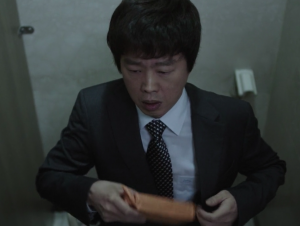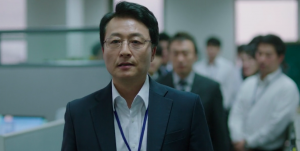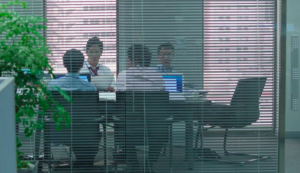Synopsis:
Mr. Park’s presence makes it hard for Sales Team Three and other employees to feel at ease in the workplace. Sales Team Three is concerned with Mr. Park’s lead in the Jordan used-car project, and finds out that Mr. Park has committed fraud for his personal gain. With the help of Geu-rae’s skills in baduk, he was able to provide evidence that allowed Mr. Park to get caught red handed. As a result, Mr. Park and one of One International’s crucial employees were forced to resign. With Chun Kwan-woong as Mr. Park’s replacement, Mr. Chun finds his likings towards his new team and is looking forward to the new challenges that will arise for them, including the revival of the Jordan project.


How well workers follow business ethics relies on how a company values it. In any company, business ethics is important in order to establish a moral image for the public (Cho 2009, 235). However, it is a contradicting idea since companies like One International will do anything they can to avoid a bad reputation, which can lead to corrupt undertakings. Thus, I will argue that Mr. Park’s unethical behaviour comes from the company’s lack of surveillance.

South Korea’s work “values of integrity, human relations and cooperation were positioned as the core factors for the ideal human type” (Cho 2009, 237). If someone in a team cannot agree to any of those values, the whole organization will fall. An individual like Mr. Park fails to value all those standards. Mr. Park’s lack of contributive work, his uneasiness towards his co-workers, and his abusive attitude towards Geu-rae has made him a hostile figure in Sales Team Three. One International only kept him because of the money he brought in for the company and that they failed to recognize his unethical behaviour.



One evident case of Mr. Park’s inappropriacy is where Mr. Park is being unprofessional towards the female employees. Because “South Korean society is experiencing conflict and confusion regarding sexual ethics”, the drama takes Chief Park to be the predator who represents someone who creates an unsafe work environment (Hwang Yoo and Cho 2016, 899). Most women tend not to confront these issues to the company since it can lead to losses for the company and more troubles for the women who want to be treated professionally. Thus, Mr. Oh who is responsible for his team, including Mr. Park, is the only one at highest authority to handle the situation without it getting out of hand. Sadly, Mr. Oh can only do so much to dissolve the situation.

One of the significant plots in the story which also relates to business ethics is where Mr. Park is committing fraud from a subcontractor who is of the same blood as him. For the benefit of the company, Sales Team Three can keep quiet and let both the companies and Mr. Park win. However, “honesty and integrity [is] a core value for personal perfection and national development” (Cho 2009, 238). Sales Team Three cares about prevailing justice for the good of society, and in a situation like this, One International must cooperate and do what they can to make things right and to preserve their image through this scandal.

As long as a company has good relationships with its clients and contributes steady profits, it should have no troubles. However, as we can see through these two episodes, there has been a lot of complications within Sales Team Three and the company as a whole. Justice has prevailed, but at the expense of both the company and the upper positions of the company.

Questions:
Dong-shik explained to Geu-rae in episode 10 that “the senior manager and the director will suffer heavy career blows. The higher your rank, the heavier the blow” [time: 1:07:00-1:07:10]. Why would that be the case and do you think we should change that idea in order to produce an honest work environment where only the victim involved in unethical affairs will be punished?

Do you think it was really a good idea for Sales Team Three to finish the Jordan project after this huge scandal? Without corruption, it could be the most beneficial project for the company, but there are always more projects out there, and Sales Team Three is already receiving bad looks from the other workers in the company. I personally thought it was not worth it, but I guess pursuing this project would make the plot line more interesting. What are your thoughts on it?

Photos are screenshots from the drama, no copyright infringement is intended.
Work Cited
Cho, Eunsang. “Work Values and Business Ethics in Korea.” Advances in Developing Human Resources 11, no. 2 (2009): 235-252.
Hwang, Kyung-Hye, Yang-Sook Yoo, and Ok-Hee Cho. “Sexual Discrimination, Attitudes Toward Sexual Health, and Consciousness of Biomedical Ethics in Korea.” Social Behavior and Personality: An International Journal 44, no. 6 (2016): 899-909.
Kim, Won-seok, dir. Misaeng. Number 3 Pictures, 2014. https://www.netflix.com/watch/80165505?trackId=200257858.
Kim, Won-seok, dir. Misaeng. Number 3 Pictures, 2014. https://www.netflix.com/watch/80165506?trackId=200257858.
Hi Jordan,
I enjoyed reading your piece expanding on the topic of business work ethics and using Mr. Park for your character analysis. I certainly found his backstory in ep. 10 to be unfortunate; and answered all the questions as a viewer, of how his unethical behaviour led him to where he is within One International, but is also his downfall.
To answer your questions:
1)
a) What Dong-shik said to Geu-rae also stood out to me in the episode as well. I think what he means is that as you move up on the social ladder, there are more expectations and responsibilities that you are held accountable for as the face of the company. So when some small incident blows up, it could really hurt one’s reputation and impression towards the company, hence the bad rep we see Sales Team 3 brings to the table every so often we hear Dong-shik mention that we should follow and comply the orders to bring up the team’s reputation and also their higher up’s.
b) I think it is a good idea that the victim involved in unethical affairs should deserve fair amount of punishment (i.e. written record on profile, or something that leaves the victim to reflect on the action further, etc.) However, I think that this kind of issue should be dealt with management or at least HR/ PR or government involvement to crackdown on training individuals to some degree on work affairs to avoid issues like corruption. For example, in Canada it seems there is a strict protocol/procedure when there is a written record on profile, and if related issues such as reporting false information, would raise eyebrows to leave for further investigation. Perhaps this is a way to track down companies who are using unethical means to earn profits.
——–
Do you think it was really a good idea for Sales Team Three to finish the Jordan project after this huge scandal? Without corruption, it could be the most beneficial project for the company, but there are always more projects out there, and Sales Team Three is already receiving bad looks from the other workers in the company. I personally thought it was not worth it, but I guess pursuing this project would make the plot line more interesting. What are your thoughts on it?
2)
a) Maybe it would have been better to close down the case, but the whole “unfinished business” seemed to stick out to me for the Jordan case/project. And I totally agree with you that if the case did not explode to great lengths with the addition of Mr. Park into the team, then this would have happened. However, I would understand why (even if it is for the sake of dramatization) Sales Team 3 would want to see it out to the end, despite having the case (and the team) already hurting their image. To think linearly, if an ‘ethical’ company followed the terms and work ethics thoroughly, then this maybe the way to show how a company ‘should’ operate – that the team showed sincerity and effort to solve the case conclusively. For example, in other dramas or in reality, where departments open up closed-cases for further investigation into the case to really look for evidence and other information to officially ‘close-down’ the case, doesn’t it give an impression that there are other things to look out for, and that there is a possibility for justice? (Maybe I am thinking a bit too idealistically, but this kind of made it look like I can trust these guys at work if these measures were taken).
Hello Anthony,
I really enjoyed reading you essay. I agreed with your claim that Mr. Park’s behaviour was largely due to a lack of company oversight. I personally grew to despise Mr. Park and found him to be a clear-cut example of almost everything that is wrong within the workplace. His bad behaviour was simply left unchecked for so long. And the only co consequence for his actions was being moved to different sections of the company. Essentially, pushing the problem to others instead of addressing it. I find it ridiculous that corrupt employees like Mr. Park can get away with so much yet hard workers like Mr. Oh constantly fear for their job.
To answer your questions:
Question #1
I think the reason why people in high ranking positions, such as the senior manager and the director, are held accountable for the actions of corrupt employees like Mr. Park, is that they are the final people in charge of approving the work these employees do. Essentially, making them the last line of defence against any discrepancies that could be from incompetence or, in Mr. Park’s case, corruption. Supposedly, if they had been doing their job properly they would have been the ones to have found the corruption (not lower level employees like Geu-rae) or stop it from taking place to begin with. Now the problem with this, is that in some cases the corruption is well hidden and near impossible for senior employees to detect. Yet, they are still held responsible. This makes it seem that when higher ranking employees are punished it is not because they are held responsible but it is the company saving face. Furthermore, it is a deterrent from companies learning of corruption, since everyone stays silent in order to protect the jobs of fellow employees.
So should responsibility be placed on those in charge of overseeing the employees? I believe each case should be looked at individually, instead of having automatic punishment for higher up employees. As a lack of oversight is problematic but may not be reasonable grounds for punishment.
Question #2
It is tough to say whether or not the Jordan project was worth going through with. From a business point of view it seems foolish to put scandal above making a profit. As an employee, benefiting the company is always in your best interest. The basic principle behind that is: the more money they make, the more more money you make.
Yet, the project came with many disadvantages for the work environment in the company. It created a divide within Sales Team Three, due to its controversial nature. And it also further divided Sales Team Three with the rest of the company. The team had always been a sort of ‘black sheep’ but due to the scandal created by former team member, Mr. Park, both the team and the project received the censure from fellow employees.
Especially, due to the damage Mr. Park did to the company and its employees. This project then became a big gamble. If they were successful they would receive both praise (for their business smarts) and scorn (out of jealousy) from co-workers.
Like you said though, from a drama perspective, it was a good device. Whether or not in real life this would have been proper conduct, I am left undecided.
1) I think the reason why the higher ranks people are being punished is because they are responsible for the people under them. An example is the senior manager’s approval of the project. It is his fault that he did not carefully assess the project which leads to the unfortunate ending for both him and the higher ups. Since a company works in a hierarchy scenario, it is only proper for the management to be punished for their lack of supervising. As seen in the military, when a soldier makes a mistake, the entire squadron, including the squadron leader, is punished with him. This is a way to ensure that the upper position people does their job properly by giving them responsibilities.
2) I do not think that pursuing this project is the correct move. The reason is that the benefits does not outweigh the costs. In office politics, the most important thing is to get the right approval from people in order to move up the ranks and gain a higher salary. If this project is a success, then nothing big will happen. However, if the project fails, then this could lead to suspensions or dropping of positions. Personally, I do not think the risk is worth it.
Your in-text citations ( Cho 235, 2009) should be (Cho 2009, 235).
Bibliography looks good.
I’ll come back for feedback on your essay.